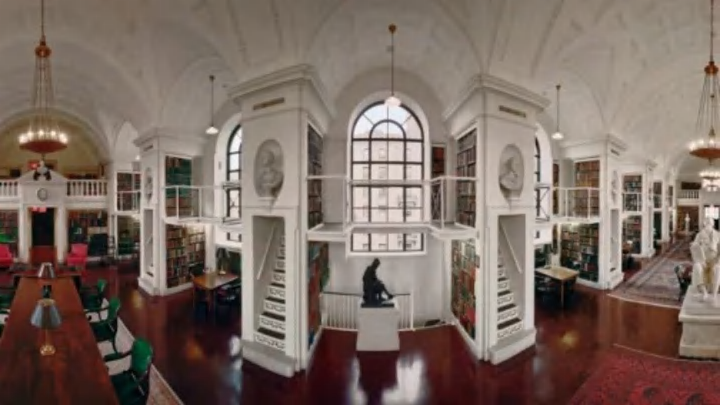In his latest book, photographer Thomas R. Schiff takes readers on a wide-ranging tour of some of the most beautiful libraries in the United States.
In this day and age, most public libraries are not beautiful. They may be cramped, near-windowless, and filled with drab, uncomfortable furniture. But in some places, there still exist public libraries that serve as beautiful temples for the written word. In The Library Book, an oversized coffee-table book of photos, Cincinnati-based panoramic photographer Thomas R. Schiff takes us on 360° tours of incredible libraries across the United States, from the famous (the National Archives in Washington D.C.) to the hyper-local (the Lillian C. Schmitt Elementary School Library in Columbus, Indiana).
“A public library is the memory, the voice, and the face of the society that houses it,” Alberto Manguel, author of , writes in the book’s introduction. Schiff's work is an ode to public architecture that’s more than just utilitarian, reflecting libraries designed to meet the highest ideals of the society that built them. In an age where you can get just about any book you could ever want on Amazon at a discount (this one included), Schiff’s photography is a reminder of the ongoing importance of these civic institutions, and the joys of perusing the stacks of a truly great library.
“Since the time of Alexandria, libraries have held a symbolic function. For the Ptolemaic kings, the library was a symbol of their power; eventually it became the encompassing symbol of an entire society, a numinous place where readers could learn the art of attention, which, [20th century political theorist] Hannah Arendt argued, is a definition of culture,” Manguel writes. “But since the mid-twentieth century, libraries no longer seem to carry this symbolic meaning and, as mere storage rooms of a technology deemed defunct, are not considered worthy of proper preservation and funding.”
Schiff—who, when he’s not out shooting panoramas, serves as the CEO of an Ohio insurance company—takes care to remind readers that libraries, whether they’re run by universities, museums, or cities, are worth investing in.
1. BOSTON ATHENAEUM, 2010

Founded in 1807 by the Anthology Society, the Boston Athenaeum was one of the largest libraries in the U.S. by the mid-19th century. It now houses more than half a million books and showcases European and American art.
2. LINCOLN PUBLIC LIBRARY, ILLINOIS, 2009

At the turn of the 20th century, Andrew Carnegie donated $60 million of his fortune to establish nearly 1700 libraries across the United States in an effort to improve public education. The Lincoln Public Library was founded by a 1901 grant from the steel magnate.
3. HERB CAEN MAGAZINES AND NEWSPAPERS CENTER, SAN FRANCISCO PUBLIC LIBRARY, 2010

The San Francisco Public Library's periodicals section is dedicated to Herb Caen, a local columnist who wrote for the San Francisco Chronicle for 60 years. At its center is Function and Fantasy Stair and Cyclone Fragment, a staircase sculpture meant to symbolize knowledge unfolding.
4. HISTORICAL SOCIETY OF PENNSYLVANIA LIBRARY, PHILADELPHIA, 2011

The Historical Society of Pennsylvania, founded in 1824, is one of the oldest historical societies in the country. Its collection spans more than 350 years of American history.
5. STATE LIBRARY OF IOWA LAW LIBRARY, DES MOINES, 2011

Located in the Des Moines capitol building, this library is as well known for its picturesque marble-and-wood interiors as it is for its law collection.
6. GEORGE PEABODY LIBRARY, BALTIMORE, 2010

Opened in 1874, the George Peabody Library was founded by the 19th-century philanthropist as part of his Peabody Institute. It is now a research library for Johns Hopkins, but per Peabody's original vision, it's still open to the public. The five levels of cast-iron balconies are topped by a 61-foot-high skylight.
The Library Book is available from Amazon for $50. We would suggest that you find it at your local library, but if you do borrow it, you probably won't want to give it back.
All images © Thomas R. Schiff from The Library Book (Aperture, 2017)
